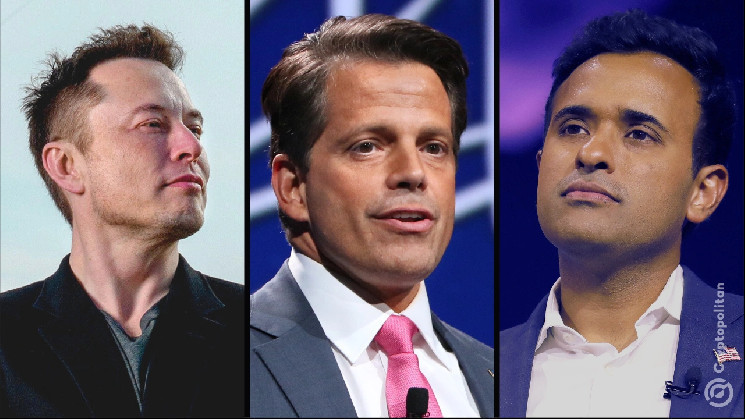Anthony Scaramucci, former White House Communications Director, shared his insight in an interview with reporter Elizabeth Vargas regarding a proposal by Elon Musk and Vivek Ramaswamy to reduce government spending by $2 trillion annually. He doubts Musk and Ramaswamy will succeed in reducing the budget using their proposed policies.
Speaking to news correspondent Elizabeth Vargas, former White House communications director Anthony Scaramucci called Musk and Ramaswamy “very smart, capable entrepreneurs.” However, he said that even though he doesn’t want to bet against them, they could fail in their budget-cut policies due to legislation protecting allocated budgets in Washington.
.@Scaramucci doubts Musk-Ramaswamy’s DOGE success: “I know how Washington works and I know how slow it is in the process of cutting things.” pic.twitter.com/wEMAvU9Brn
— Yahoo Finance (@YahooFinance) December 12, 2024
In his interview, Scaramucci acknowledged the importance of cutting government waste but emphasized the complexities involved. He pointed out that while the U.S. population has grown significantly since the 1980s, the number of federal employees has remained largely unchanged since the Reagan era.
He highlighted previous attempts to address government inefficiencies, such as the Reagan-era Grace Commission and the Simpson-Bowles plan during the Obama administration. Despite their ambitious recommendations, these reports were largely dismissed by lawmakers, illustrating the difficulties of implementing fiscal reform.
Scaramucci: Government is not like a for-profit business
Scaramucci warned against treating the government like a for-profit business, arguing that its primary purpose is to serve the public. “The government is there to protect people, smooth out economic cycles, and provide a safety net,” he said.
Moreover, he noted that no company has remained in the Dow Jones Industrial Average for a century, while the U.S. government has persisted for over 250 years due to its unique role and nonprofit orientation.
The former White House communications director also criticized proposals to slash essential programs, such as veterans’ medical care, calling such cuts “politically unpalatable and cruel.” Scaramucci stressed the importance of safeguarding programs that provide fairness and equal opportunities for Americans.
Drawing on historical examples, the American financier advocated for a return to “pay-as-you-go” legislation, initially introduced under President George H.W. Bush. This approach required Congress to balance new spending with corresponding budget cuts or tax increases. He credited this policy with helping achieve a budget surplus during the Clinton administration.
By reinstating similar fiscal guardrails, Scaramucci suggested it could take a decade to bring the deficit to sustainable levels without dismantling critical government structures.
Scaramucci proposed gradual measures to curb spending. He suggested limiting the organic growth of departmental budgets, typically 3-5% annually, to achieve “zero growth” in certain areas. Over time, he argued, as GDP and tax revenues increase, this strategy would help reduce deficits.
The feasibility of Musk’s plan
While Musk’s call for $2 trillion in cuts resonates with fiscal conservatives, Scaramucci highlighted its practical challenges. Major budget areas like Social Security, Medicare, and military spending remain politically untouchable, with both Musk and former President Donald Trump avoiding cuts in these areas.
Public opinion also favors maintaining or increasing military funding, further complicating the equation.
Billionaire entrepreneur Musk and Republican Vivek Ramaswamy are set to helm the Department of Government Efficiency (D.O.G.E.) under the upcoming Trump administration.
The initiative aims to tackle the persistent issue of federal overspending by auditing the executive branch and offering solutions to curb wasteful expenditures. Observers have noted parallels between their proposed efforts and Argentina’s recent fiscal reforms, which have brought the nation’s budget deficit to effectively zero for the first time in over a century.
Argentina’s Milei eliminates deficit, hailed as model for Musk’s ‘DOGE’ https://t.co/M279vP1AIZ
— FOX Business (@FoxBusiness) December 12, 2024
Argentina, under President Javier Milei, achieved a historic budgetary turnaround in 2024. The International Monetary Fund (IMF) reported that the country’s deficit, once a defining feature of its economy, has been eliminated.
Adapting Argentina’s approach to the U.S.
Musk and Ramaswamy are reportedly drawing inspiration from Argentina’s policies as they develop their strategy for the United States. The D.O.G.E. program, while not an official government agency, will function as an advisory body providing detailed recommendations to President-elect Donald Trump. These recommendations are expected to focus on reducing waste and improving efficiency in federal operations.
The program’s scope includes a comprehensive audit of the U.S. executive branch, identifying redundant programs and bureaucratic inefficiencies. Despite its ambitious goals, D.O.G.E. does not possess direct enforcement powers. The Trump administration will ultimately decide which of the organization’s proposals to implement.
From Zero to Web3 Pro: Your 90-Day Career Launch Plan

